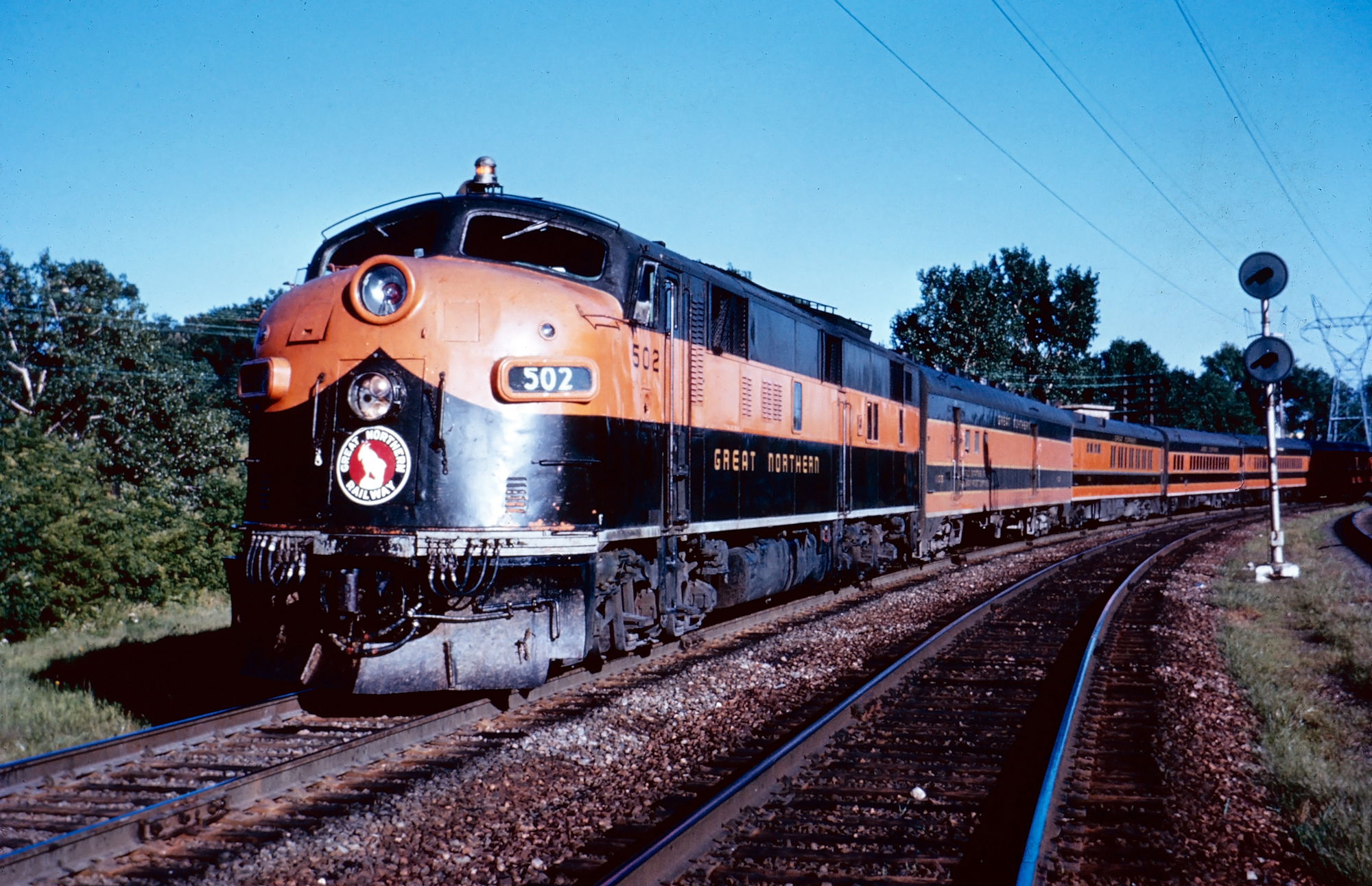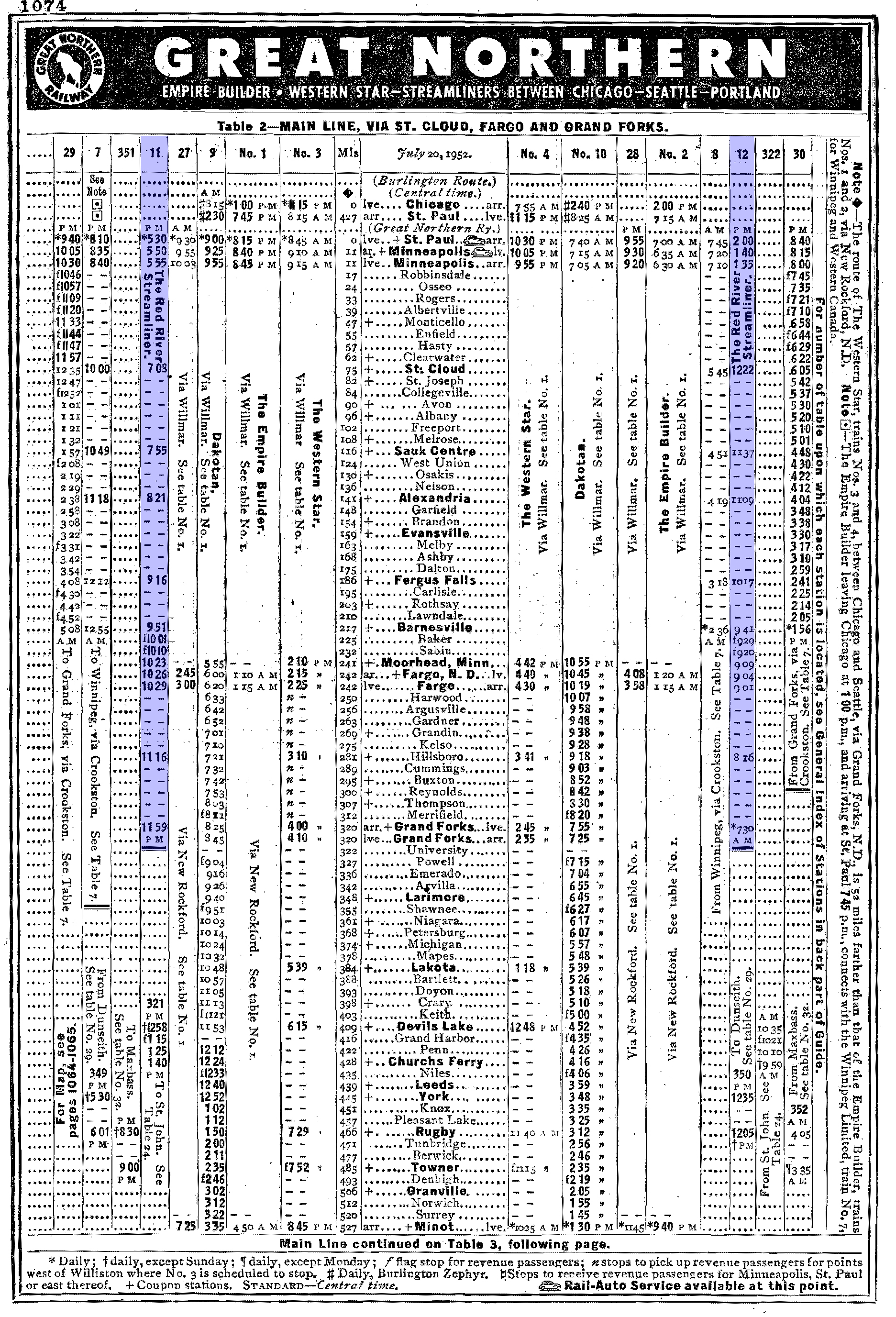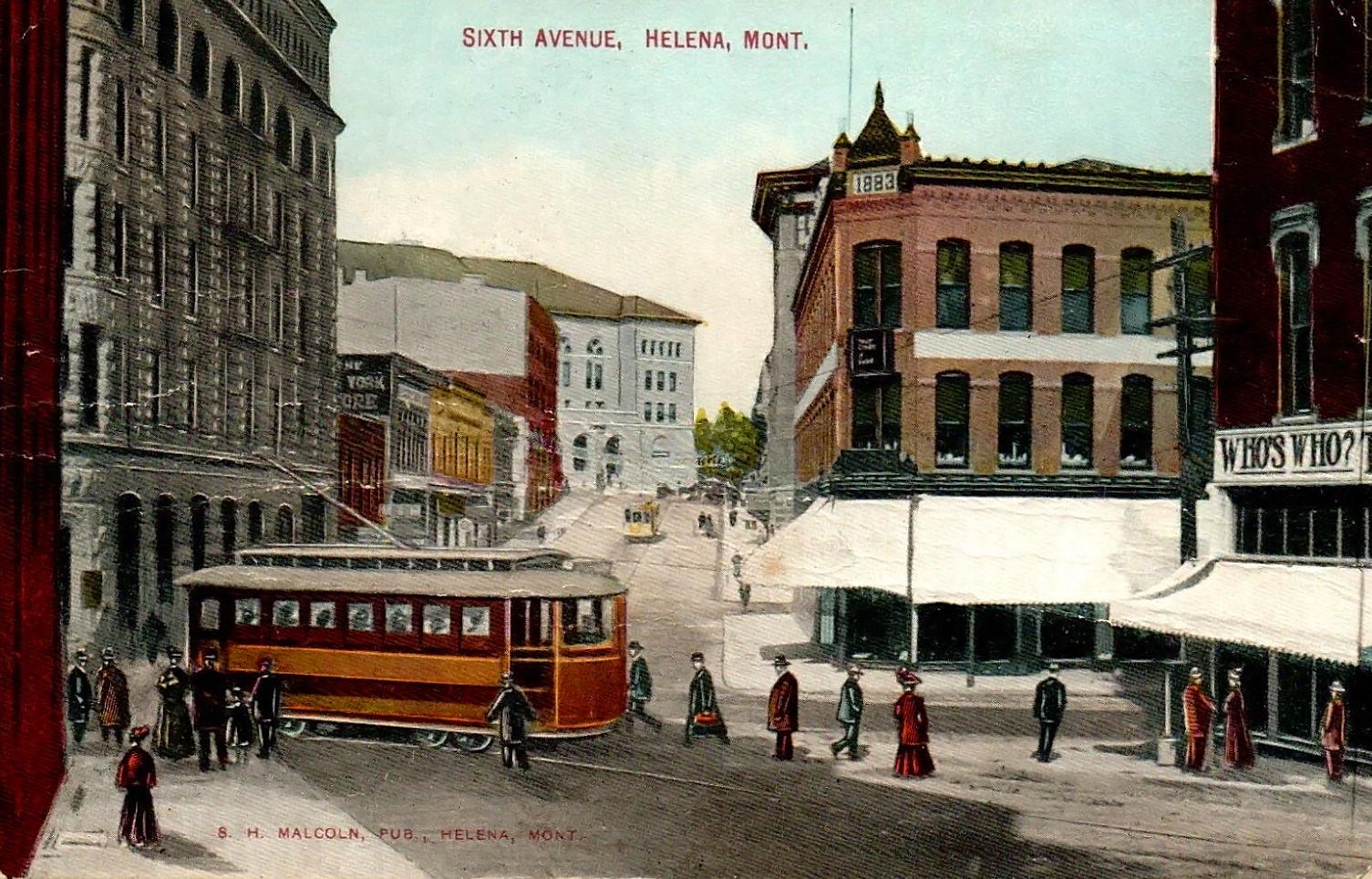The "Red River": Twin Cities-Grand Forks, ND
Last revised: September 12, 2024
By: Adam Burns
The Red River was a named passenger train operated by the Great Northern Railway between the cities of St. Paul/Minneapolis and Grand Forks, North Dakota.
It was named after the Red River of the North, which the route paralleled. It ran a total of 320 miles between the two cities and offered guests an impressive level of services during the 6 to 7-hour trip.
The completely lightweight streamliner provided luxury coaches and a parlor-observation-coffee shop-dinette car, the latter of which included complete dining amenities.
Unfortunately, the train was short-lived, operating wholly lightweight equipment from its 1950 inauguration until being canceled in 1968.
Photos
 Great Northern's "Red River" was photographed here near St. Paul, Minnesota, circa 1960. This streamliner connected the Twin Cities with Grand Forks, North Dakota. Jay Thompson photo. American-Rails.com collection.
Great Northern's "Red River" was photographed here near St. Paul, Minnesota, circa 1960. This streamliner connected the Twin Cities with Grand Forks, North Dakota. Jay Thompson photo. American-Rails.com collection.Inauguration
The Great Northern's Red River carries an enduring legacy in the annals of railroading history. It traversed from the Twin Cities to Grand Forks, North Dakota, acting as a critical land bridge between these two northern metropolises.
The train was a very late addition to the GN timetable, launched on June 25, 1950 as a completely lightweight streamliner. The premier daily service offering a unique blend of opportunity, necessity, and opulence during its golden years of service.
Named after the North Dakota's famed Red River, it ran in both directions with morning departures and evening arrivals, a reliable constant in the backdrop of the changing 20th-century American landscape.
The Red River's typical five-car, American Car & Foundry consist, led by an E7A included:
- #1107 Baggage/Railway Post office Car
- #1137 60-Seat Coach
- #1138 60-Seat Coach
- #1139 60-Seat Coach
- #1147 9-seat Lunch Counter/12-seat Dinette/16-seat Parlor Lounge Observation
Consist (1952)
A May, 1950 brochure the railroad released highlighting the service notes it offered full dining service offering "...a variety of a la carte and table d'hote meals at reasonable prices. Light snacks at economy prices are available in the adjoining coffee shop. All food is prepared in a fully-equipped and glistening stainless steel kitchen."
The brochure went on to note:
"The RED RIVER is the newest member of Great Northern Railway's distinguished and growing fleet of deluxe streamliners.
This all completely new streamliner consists of five cars — a baggage-mail, three coaches and a parlor-observation car, including a coffee shop and dinette — of lightweight streamlined construction. The RED RIVER offers a new Great Northern service to the territory served with faster schedules than any previously in effect on this route.
The five cars were built by American Car & Foundry Company. The 2,000-horsepower diesel-electric locomotive was constructed by Electro-Motive Division of General Motors Corporation.
In selecting the name RED RIVER, which is derived from the famous Red River of the North, Great Northern pays tribute to the great valley which is part of the territory served by the new streamliner.
The finest in modern transportation the RED RIVER is another beacon of progress in the rich region served by Great Northern."
The train’s interior was indeed a sight to behold. Ornate décor and refined details offered passengers an experience akin to a luxury hotel. The upholstery and panels played on themes and colors of the region including corals, creams, grays and golds.
The train's two murals included the wild prairie rose - North Dakota's State Flower - and the moccasin flower - Minnesota's State Flower. Finally, blue gentians and golden sunflowers, which are abundant in the Red River Valley, decorate the other two panels.
The parlor observation car continued to play on the themes of Minnesota and North Dakota farming featured sugar beet, potato, wheat and dairy farms on carved glass mirrors. Lastly, three bas-reliefs by American sculptor K. George Kratina in maple wood featured flying Canadian geese - a nod to the region's hunting - and a grain elevator.
The train's luxury wasn't limited to those who could afford first-class tickets. High-quality service and amenities were offered throughout the train, irrespective of the ticket class, still remembered today for its hospitality and comfort.
The Red River played a significant role in extending the reach of the Great Northern during the streamliner era as the railroad hoped to recapture passenger business lost to the airplane and automobile.
Decline
Despite its successful years of service, time began taking its toll on the Red River. As roads improved and air travel became commonplace, passenger rail travel saw a decline. Post-World War II America presaged the death knell for many long-distance passenger trains. The Red River was no exception.
In their book, "The Great Northern Railway: A History," authors Ralph Hidy, Muriel Hidy, Roy Scott, and Don Hofsommer note the train's termination was largely due to management's decision in abolishing the RPO from its consist.
Timetable (1952)
Legacy
As a result, the train's last run was in 1968. The Red River's discontinuation was a loss to rail enthusiasts. The legacy of the Red River changed the landscape of railway travel. It was more than just a railway service; it encapsulated an era of American history.
It offered passengers a unique blend of comfort, style, and adventure, a journey through the picturesque American landscapes all the while providing crucial links to isolated northern towns. Its rich history and contribution to the development of the Northwest remain an unforgettable chapter in the annals of American railways.
Recent Articles
-
Wine & Cheese Trains: A Complete Guide
May 02, 25 11:23 AM
Discover where you can find the unique wine & cheese train experiences throughout the U.S., usually found at upscale attractions like the Napa Valley Wine Train and Strasburg Railroad -
Murder Mystery Train Rides: A Complete Guide
May 02, 25 09:44 AM
Murder mystery dinner train rides have been a popular type of train excursion for many years. Find out where these trips can be found. -
Montana Interurbans and Streetcars: Lines, History, Photos
May 02, 25 12:31 AM
The state of Montana contained no true interurban system but a number of cities did operate local electrified streetcar systems.




